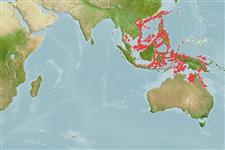>
Eupercaria/misc (Various families in series Eupercaria) >
Cepolidae (Bandfishes) > Cepolinae
Etymology: Acanthocepola: Greek, akantha = thorn + Latin, cepulla, cepa = onion.
More on author: Valenciennes.
Environment: milieu / climate zone / depth range / distribution range
पारिस्थितिकी
समुद्री ड़िमरसल; गहराई सीमा 80 - 100 m (Ref. 43239). Temperate; 26°N - 20°S, 72°E - 149°E (Ref. 56298)
Indo-Pacific: India to Gulf of Papua; north to Japan; south to Australia.
आकार / वज़न / Age
Maturity: Lm ? range ? - ? cm
Max length : 50.0 cm TL पुल्लिंग / अलिंग; (Ref. 559)
पृष्ठीय सौफट रेज़ (सम्पूर्ण) : 102 - 104; ऐनल सौफट रेज़: 105 - 107.
Adults pair and feed in loose groups; juveniles gather in small groups on deep sand slopes, usually in current-prone areas (Ref. 48635). Occurs in mud bottoms 15-100 m deep (Ref. 90102). Commonest member of the Japanese cepolid fishes. Caught by trawl net from sandy or muddy bottoms. Used mainly for fish cake. (Ref. 559 and 637). Minimum depth of 15 m reported from Ref. 90102.
Life cycle and mating behavior
Maturities | पुनरुत्पत्ति | Spawnings | Egg(s) | Fecundities | लार्वा
Masuda, H., K. Amaoka, C. Araga, T. Uyeno and T. Yoshino, 1984. The fishes of the Japanese Archipelago. Vol. 1. Tokai University Press, Tokyo, Japan. 437 p. (text). (Ref. 559)
IUCN Red List Status (Ref. 130435)
Threat to humans
Harmless
Human uses
मात्स्यिकी: व्यापारिक
साधन
Special reports
Download XML
इंटरनेट स्रोत
Estimates based on models
Preferred temperature (Ref.
123201): 20.2 - 26.6, mean 24 °C (based on 40 cells).
Phylogenetic diversity index (Ref.
82804): PD
50 = 0.5625 [Uniqueness, from 0.5 = low to 2.0 = high].
Bayesian length-weight: a=0.00513 (0.00222 - 0.01187), b=2.82 (2.61 - 3.03), in cm total length, based on LWR estimates for this (Sub)family-body shape (Ref.
93245).
Trophic level (Ref.
69278): 3.4 ±0.4 se; based on size and trophs of closest relatives
लौटाव (Ref.
120179): माध्यम, न्यूनतम जनसंख्या दुगनी होने का समय 1.4 - 4.4 वर्ष। (Preliminary K or Fecundity.).
Fishing Vulnerability (Ref.
59153): Moderate vulnerability (40 of 100).
